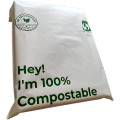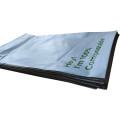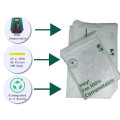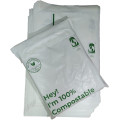Latest Articles
- Eco Straws: Revolutionizing Beverage Consumption with Sustainable PHA Alternatives
- UN Projects an 80% Reduction in Plastic Pollution by 2040
- The Wider World April 2023 - Politics, Climate Change & Ukraine
- Monibot: Devastating impact of our reliance on fossil fuel
- New study suggests 170tn plastic particles afloat in oceans
Compostal 3000 x Eco Mailing Bags - Mailer Compostable 2000pcs 25 x 35cm (10 x 14 Inches)
Price:
$365.00
- 100% biodegradable poly mailing bags made from corn starch resin
- 9.8" by 13.8" usable packing area
- ABAP certified for home composting
- 60-micron thickness
- 25 x 35cm usable packing area
- 3000 Bags. Compatible with labels or addresses can be handwritten
- A much more environmentally friendly alternative to conventional poly mailers
- Completely biodegraded within 9 months
- Certified to home and industrial standards
- Great for Royal mail large letter or small parcels.
Compostable bags are made from biodegradable materials and can be broken down by microorganisms in a composting environment. They offer several benefits over traditional plastic bags, including:
-
Reduced Environmental Impact: Compostable bags are made from renewable resources and do not add to the plastic pollution problem.
-
Improved Soil Quality: When composted, these bags contribute to the creation of nutrient-rich soil that can be used for gardening and agriculture.
-
Reduced Landfill Waste: Compostable bags are designed to break down quickly, reducing the amount of waste in landfills.
-
Carbon Sequestration: Composting can reduce greenhouse gas emissions by capturing carbon.
-
Closed-loop systems: Compostable bags can be part of a closed-loop systems where organic waste is collected separately and then composted, reducing the need for fossil fuels to produce synthetic fertilizers.
-
Cost-effective: Composting can be a cost-effective way of dealing with organic waste because it reduces the need for expensive disposal methods such as landfilling or incineration.
- Reduce, reuse, and recycle plastic: The most effective way to reduce plastic in the ocean is to reduce the amount of plastic that is produced in the first place. Reusing plastic items and recycling plastic when possible can also help to reduce the amount of plastic that ends up in the ocean.
- Properly dispose of plastic waste: Improper disposal of plastic waste, such as littering or inadequate waste management, can contribute to plastic pollution in the ocean. Make sure to properly dispose of plastic waste in trash cans or recycling bins.
- Support policies to reduce plastic pollution: Support policies and laws that aim to reduce plastic pollution, such as plastic bag bans, extended producer responsibility programs, and deposit refund systems for plastic bottles.
- Support organizations that work to reduce plastic pollution: Support organizations that work to reduce plastic pollution in the ocean, such as The Ocean Conservancy, Plastic Oceans International, and 5 Gyres.
- Write to your local MP to ask about increasing plastic tax and charges
- Educate others: Spread the word about the impact of plastic pollution on marine life and encourage others to take actions to reduce plastic in the sea.
- Use alternatives to single-use plastic: Avoid single-use plastics, such as straws, plastic bags, and plastic cutlery, and instead use reusable or biodegradable alternatives.
- Be mindful of your consumption: Be mindful of the products you buy and their packaging. Avoid products with excessive packaging and opt for products packaged in sustainable materials.
- Participate in beach cleanups: volunteer to participate in beach cleanups in your local community which help to remove plastic waste from the ocean and shorelines.
Video Demo of Compostable Bags








